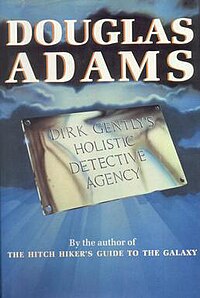
I first attempted reading this book as a teenager, and did not get it. I couldn't visualize most of it, I didn't understand it, and it committed the cardinal sin - for Douglas Adams - of not amusing me. I was also aggravated, in that way that only self-important teenagers can get, that Adams reused characters and concepts from two of his Doctor Who scripts. One of them, "Shada," was never actually completed, due to a big conflict between the BBC and one of the unions, and so Adams felt it was okay to move characters and settings into a new "universe" and give them a chance to be seen. Humorlessly, I was incensed by this, probably to such a degree that nobody, not even the remarkable Adams, could let the grouchy sixteen year-old idiot that I was see the funny side of it.
It is a really weird book, with the titular Dirk Gently serving as a supporting character for much of it. He was once a classmate of a computer programmer, Richard MacDuff, at St. Cedd's College, Cambridge. MacDuff returns to St. Cedd's to visit with his former tutor, "Reg" Chronotis, who made the jump from "Shada" into this book. MacDuff and Chronotis become aware of a curious problem that involves time travel, ghosts, structurally impossible sofas, and the poems of Samuel Taylor Coleridge. Agonizing Beatles puns are also involved.
Dirk Gently, a master of very strange coincidences, is now working as a "holistic" detective, vaguely solving crimes and finding missing cats by noting how everything in the world is, somehow, interconnected. He gets involved, or, rather, manipulates MacDuff to ensure his involvement. Having seen Steven Moffat's amazing Sherlock, I could not read Gently without hearing Benedict Cumberpatch's voice. (Stephen Mangan plays the character in a new BBC TV series that part of me is afraid to watch for fear of spoiling that voice!)
The climax of the book is still a little bit troubling. Adams can be forgiven for reusing St. Cedd's, Chronotis, and noticeable bits of dialogue from "Shada," as it was not completed and wouldn't even be made publicly available in its unfinished form for another five years. (Gareth Roberts, who is as close to Adams' spiritual successor as any we're likely to get, has actually novelized that story, and I understand that the book is to be released this month.) However, it's one thing to rip off your unfinished, unpublished work and another to borrow from something that was shown and repeated worldwide. The climax is lifted entirely from another Who serial by Adams, "City of Death," and it just feels like cheating.
On the other hand, the book really is funny and I enjoyed both the incredibly clever structure and the twinkling wit on display. And perhaps, in the end, the climax shouldn't be that much of an issue when all of the getting there is so entertaining. Adams, if we are honest, always did have trouble with the conclusions of his stories. None of the Hitchhiker's Guide tales have endings even a quarter as entertaining as the loopy and wild journeys along the way, and, let's face it, the guy completely botched his own ending, having the poor sense to die a good thirty or forty years before he should have. A small reservation, then, and recommended over and above it.
No comments:
Post a Comment